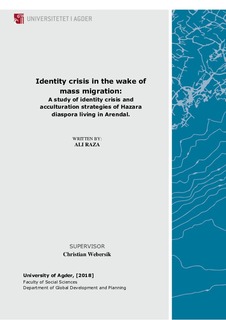| dc.contributor.author | Raza, Ali | |
| dc.date.accessioned | 2018-10-02T08:31:27Z | |
| dc.date.available | 2018-10-02T08:31:27Z | |
| dc.date.issued | 2018 | |
| dc.identifier.uri | http://hdl.handle.net/11250/2565669 | |
| dc.description | Master's thesis Global development and planning UT505 - University of Agder 2018 | nb_NO |
| dc.description.abstract | In 2015-16 a record number of migrants applied for asylum in the 28 member states of the European Union, Norway and Switzerland– nearly double the previous high water mark of 1992 after the fall of the Iron Curtain and the collapse of the Soviet Union. This scenario raised a number of questions for researchers and development practitioners in understanding and managing the migration issues and acculturation processes develop in the aftermath of the scenario. Keeping in view this situation, the aim of this dissertation is to ascertain the consequences of migration on a group of people or community belonging to an underdeveloped country who migrated to a developed country such as Norway. In this study the target group is Hazara community who have migrated from Afghanistan, Iran and Pakistan and settled in the city of Arendal. The main objective of the study is to evaluate the challenges they face in Arendal and more specifically understanding how the migration of people belonging to Hazara ethnic group into the developed world affect their traditional identity. Although the impact of the migration differ from individual to individual yet here the hypothesis is based on thoughts and activities of general majority because of the nature of study. Using a qualitative paradigm, the primary data was collected mainly through ethnographic methods of participant observation and life history interview. Four main areas of discussion for the study deriving from the theoretical background were forced migration, acculturation, ethnic identity and social capital. The findings of the study revealed several mechanisms similar to the ones discussed in the literature. In order to understand the migration and acculturation processes of the Hazara community, there were two major elements that I found extremely important. Firstly, their past experiences of socio-political and economic deprivations in their home country. Secondly, the acculturation strategies of Hazara community in the host country where they can enjoy all types of human rights and freedom underpinned by Norway’s asylum and immigration legislation. It may be mentioned here that there is room for further inquiry into the matter as it was not possible to comprehend the views of Hazara diaspora living in other localities and regions. | nb_NO |
| dc.language.iso | eng | nb_NO |
| dc.publisher | Universitetet i Agder ; University of Agder | nb_NO |
| dc.rights | Attribution-NonCommercial-NoDerivatives 4.0 Internasjonal | * |
| dc.rights.uri | http://creativecommons.org/licenses/by-nc-nd/4.0/deed.no | * |
| dc.subject | UT505 | nb_NO |
| dc.title | Identity crisis in the wake of mass migration : A study of identity crisis and acculturation strategies of Hazara diaspora living in Arendal | nb_NO |
| dc.type | Master thesis | nb_NO |
| dc.subject.nsi | VDP::Samfunnsvitenskap: 200::Sosiologi: 220 | nb_NO |
| dc.source.pagenumber | 73 p. | nb_NO |

